Today is Palm Sunday. It is the beginning of the end of a man, whom for many of his followers did not see him as what He claimed to be, the Son of God. However for us, today is the beginning of the time when we welcome Jesus into Jerusalem and support him in his last days until we meet him again after the resurrection.
The royal entry of Jesus into Jerusalem is not just an event that took place by chance. Jesus knew well what He was doing, and for sure He thought of every step before he headed for Jerusalem. Jesus’ entry into the city of Jerusalem was not his first time, but it was a time that echoes many details from the life of the ancient kings of Israel and contemporary history.
The four canonical Gospels portray several aspects about Jesus’ triumphal entry into Jerusalem, which I would like to share with you so as to better understand the real meaning of this event, and also the welcome and rejection of the people who saw him coming into Jerusalem.
If we go over the different narratives of Jesus’ entry into Jerusalem, we will be able to see a very simple fact in all of them: the Jews were angered and offended by the trouble that Jesus had created with his trip to Jerusalem. And they were right to have this kind of sentiment because Jesus’ triumphal entry took place during one of the most important festivals in the Jewish calendar, the Passover. And as we all know at the Passover the Jews commemorate their liberation from slavery and the exodus of the Israelites from Egypt, which took place 3000 years before Christ.
As we continue reading the narrative event, we will see Jesus coming through the main gate of Jerusalem and people at both sides welcoming him with palm branches. This was an insult not only to the Jews and to the High Priests but also to the Romans, and again they had the right to have this kind of sentiment, since the welcoming with palm branches was a symbol of triumph and victory in the Greco-Roman culture of the Roman Empire, and was the most common attribute of the goddess.
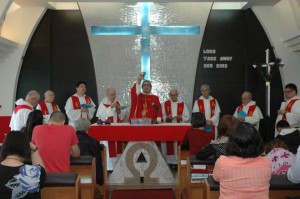
Another symbolism that Jesus used when he entered Jerusalem was that of Jesus riding a donkey. Once again the religious authorities, and the Romans felt offended and angered, and again they had the right to have this kind of sentiment. This symbolism referred to the Eastern tradition that a donkey is an animal of peace, versus the horse, which is the animal of war. A king rode upon a horse when he was sent on war and rode upon a donkey when he wanted to point out he was coming in peace.
Jesus entry into Jerusalem had a very powerful message for the people of his time and for all of us. It symbolized a triumphal entry but not as a war king but as the Prince of Peace, which in some way was contrary to the thinking that the people of his time had about the Messiah. This humble but powerful act makes Jesus being recognized by some and rejected by others.
Jesus is recognized as the Son of God by those who at the gates of Jerusalem, in humility are full of the hope that redemption would come. They cry “Hosanna†and lift up the palm branches and cast their poor garments of little worth on the grounds before Jesus as they recognize the one who comes in the name of the Lord.
Jesus’ public life messages, his miracles and now his entry into Jerusalem like a king of peace is what made others reject him crying out not “Hosanna†but “Barabbas†and later “Crucify himâ€. They were the people who saw Jesus blocking their passage in and out of Jerusalem and wanted to put him out of their way. They were the people who would only accept Jesus if he is the Messiah that they wanted.
My dear brothers and sister, like the people in the crowd waiting for Jesus to enter Jerusalem, it is easy for us to be part of the crowd and cry out “Hosanna†and it is easy for us also to shout even louder “Barabbas†and later on “Crucify him.†It is easy for us to be part of the crowd to look from a distance at Jesus carrying the cross. It is easy for us to be part of the crowd that follows Jesus to Calvary and see his crucifixion, and go back home sad and disappointed.
In our daily life, it is easy to be part of the crowd and confess ourselves disciples of Jesus; to shout aloud that we love each other, but we are never there when our brothers and sisters need us most. It is easy to hide ourselves in the crowd and never take the first step to forgive. The crowd is afraid of proclaiming Jesus’ message and so we are. The crowd abandons Jesus because he is not the God they want and so too we hide ourselves in the crowd and become one of them, because sometime we want another God, because He is blocking our way in and out of our own life.
As it does every year, today the Church invites us to reflect upon the sequence of events in the life of Jesus – beginning with his triumphal entry into Jerusalem, which we commemorate today, through the events of the Last Supper, his agony in the Garden of Gethsemane and betrayal to his crucifixion and death. But we have to reflect not so much about how much Jesus suffered, but rather about how much He loved. Let us not be naive and think that pain and suffering for the sake of suffering is redemptive. Contrary to what many people believe, suffering is not necessarily redemptive. What makes the pain and suffering of Jesus redemptive is the fact that it resulted from his extraordinary love for us.
Let us remember the words of Alice Cary: “True worth is in being, not seeming: in doing, each day that goes by some good.” During this Holy Week let us wrap ourselves not with sorrow and suffering but with love and forgiveness. With the new spirit of having been saved, let us show our gratitude, even in the mist of our own physical or spiritual suffering, by helping others to know God and getting sinners to return to God.
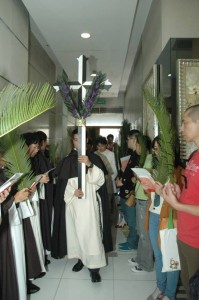
Fr. Alejandro Salcedo, OP
St. Dominic’s Priory
March 29, 2015

Death, since the beginning of history, has been seen as an entity without remedy, becoming part of our daily life. We have discovered that death is inevitable and have experienced and suffered the hurt caused by death. Likewise, it is the desire of our human nature to leave behind somebody or something to remember us. We all want, in some way or another, to be immortalized. In the ancient world, emperors and pharaohs left big mausoleums, temples and high pyramids. In our present world presidents erect big statues as memorials. But time tells us that people have turned them into a place of ruins. We too want to leave something behind not to be forgotten, a big family or a big fortune perhaps, but time also tells us that time erases the memories of those who lived before us.
During these past three days the liturgical readings have been narrating Jesus’ pain and suffering; from the Upper Room all the way up to the Cross. As the disciples witnessed Jesus’ death and burial, all his promises turn out to be a failure; his teaching, his miracles, the Last Supper, all the way up to the Calvary, his death and the place where they put his body to rest would be the only things left to remember this man called Jesus. And so it will be for us if we end our journey at the Calvary Cross of Golgotha.
My dear brothers and sisters, we cannot end our journey here, we must move on. Golgotha must lead us to the empty tomb of the Resurrection. As Pope Emeritus, Benedict XVI said: “The Cross alone could not explain the Christian Faith, indeed it would remain a tragedy, an indication of the absurdity of being. The Paschal Mystery consists in the fact that the Crucified man ‘was raised on the third day, in accordance with the Scriptures’.
Jesus immortalized himself, not by leaving behind big temples or doctrines, but by means of an empty tomb. And it is here where we, each one of us, are immortalized. It is not in the cross but in the empty tomb that we have a new kind of future. Death, darkness, emptiness, desolation are not our ultimate destiny. It is in the risen Christ that we have a future full of meaning, purpose, joy, and hope. 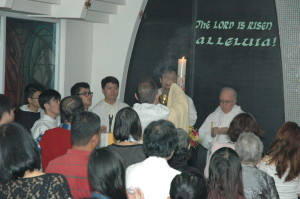
Mary Magdalene and the other Mary experienced in a human way the reality of the empty tomb. They were bewildered, confused and went back to tell the other disciples what the angels told them. The disciples’ reaction to the women’s news was taken on a big “aw†as they went to the spot where they were told Jesus was not. They did not know where he was but for the time being they were more interested in where He was not. And it was here, inside the tomb where they remembered and understood what He had told them about rising from the dead.
The empty tomb of the Resurrection has been the mystery, the scandal, the big question mark for twenty one centuries and will continue being for centuries to come. The empty tomb of the Resurrection is the proof that we can give to our fellow men that we have found the secret of our life. The disciples were given a mission. “Go and announce the good newsâ€. Today the church gives the same mission. “Go and announce to the world this good news.†Announce that we have found the means to immortality.†Announce that we do not need to turned to the supernatural world for answers, or to metempsychosis in order to live a longer life, we do not need to search for the Philosopher’s Stone or to achieve physical immortality through spiritual transformation.
The example set by Jesus demands us to begin. We are not expected to do everything, but every one of us is expected to do something. There is no greatest mistake than he who does nothing because he can only do little. Day by day we are called to let Jesus’ resurrection to become the driving force of our new life. Just knowing about the resurrection is not enough. The good news of the resurrection must be brought into the concrete realities of our daily life.
The light of the Easter candle will reminds us of the sure hope that the Spirit of the Risen Lord continues to act in our lives and in our world. Easter is a time when we realize that what humankind has long for in the depths of our hearts has become a reality. Easter is a joy born on the belief that the resurrection of Jesus is our ransom from death. If we really believe that the tomb is empty, that the Lord is truly risen and is with His Church we should have no fear in bringing this message, as it is, in all its authenticity, into our world and to our younger generation.
May God bless each and every one of us and may the peace of the risen Christ be with you and your families. On behalf of Saint Dominic’s Priory Community and on my own behalf I would like to thank you all for coming and forming our community of prayer this evening. May sadness forget you, may goodness surround you and may the risen Christ always bless you. Wish you all a Blessed Easter.
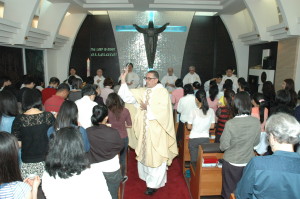
Fr. A. Salcedo
Prior

Â
After listening to tonight’s gospel we can conclude that Jesus knew that his hour had come to depart from this world and go to the Father. According to the hints given by the gospel, Jesus also knew that the Jewish authorities had offered a reward to turn Him in. He needed to be careful, so that He could slip into Jerusalem and the upper room without being seen. The man carrying the jar of water is a signal of the advance arrangements for Jesus to celebrate the Passover meal with his disciples, since only women would carry a jar of water. This signal of the man and the jar, would allow recognition between the two disciples and the man without an exchange of words.
Although John’s Gospel does not recount any event regarding the preparation of the Passover meal, however the rest of the Gospels do so. In Mathew’s Gospel we can read: “Go to a certain man in the city and tell him, the Teacher says, my hour has come, my disciples and I will celebrate the Passover at your house. Mark and Luke recount the same event with very similar words saying: As you go into the city, a man carrying a jar of water will meet you. Follow him into the house that he enters, and say to the owner of the house: The Teachers says to you, where is the room where my disciples and I will eat the Passover meal?
We can also imagine what the Upper Room looked like. It would be furnished with carpets to recline on, as well as low tables to place the meal upon. The two disciples would have made sure all the things and dishes of the Passover were ready: The unleavened bread, the wine in four cups, bitter herbs, a sauce made of dried fruit, spices and wine, and a roasted lamb.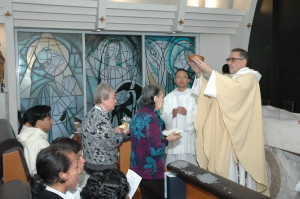
The whole Passover meal was framed in a liturgy of festivity and celebration, being the Passover prayer, said by the head of household in this case Jesus, the culmination of the dinner. However Jesus breaks the festive mood when out of the total context of the Passover meal he rose, took a towel, poured water into a basin and began to wash the disciples’ feet. We see the reaction of the disciples and especially the resistance of Peter to have his feet washed by Jesus: “Are you going to wash my feet?’ “No, you shall never wash my feet.†With the washing of the feet Jesus gave them a example to be followed and a total new commandment, “what I have done unto you do it unto others…. love one another, as I have loved you.”
But this would not the only surprise Jesus would give them on that night. Still there was more to come. Can you imagine the disciples’ face when Jesus blessed the bread and the wine and gave it to them saying: “This is my body, this is my blood.†In this singular action, Jesus established the Priesthood to perpetuate the Eucharist and in a mysterious and sacramental way, He commanded His apostles and their successors to renew this act of love until the end of time when He said: “Do this in remembrance of Me.â€Â For sure Jesus noticed the disciples’ doubts and speculations when Jesus passed them the bread and the wine and that is why He told them “You do not really know what I am doing, but later you will understand.â€
What was supposed to be a meal rooted on the law and the rich tradition of their ancestors, Jesus turned it outside down. Up to this point the festive mood of the Passover meal was change into a mood of wondering. However, with Jesus’ final words “I tell you the truth, one of you will betray me, one who is eating with me†the mood was changed into a mood of questioning. “Is it I?†they all asked. “It is one among you,†Jesus replied, “one who dips bread into the bowl with me.†But this was not a straight answer to their question since all of them had dip bread into a bowl of bitter herbs.
My dear brothers and sisters, this night confronts us with the harsh reality of what it means to be truly human and truly Christian. “I have given you a model to follow. As I have done, so you must do.†What Jesus did horrified the disciples and also horrifies us because it takes us out of our comfort zone. It takes us out of the world of ideas and concepts. It challenges us to admit of our need for love and forgiveness, for healing and hope. It also challenges us, priests, religious and lay faithful, to find our deepest meaning, purpose and peace in the pattern of Jesus’ life, in the service that we offer to others.
 Jesus actions disturb us because they push us into a world of needs. The world is at war, hate and envy and injustices exists in our midst because of people who put more importance on themselves and their interest rather than serving others. We live in a world, which God still loves. Jesus is calling all of us to take up a towel, a jug and basin, to set aside our pride and self-importance and to bend down to the ground and serve others like Jesus did. It is in the midst of this human struggle, in the drama of the ultimate query that make the human person question if there is not more to life than ‘this life’, that Jesus exhort us to become personally engaged in the endeavour to bring our service and God light and hope in the resurrection to the people or our time, who like the disciples in the Upper Room, live a life of wondering, questioning and doubts.
Jesus actions disturb us because they push us into a world of needs. The world is at war, hate and envy and injustices exists in our midst because of people who put more importance on themselves and their interest rather than serving others. We live in a world, which God still loves. Jesus is calling all of us to take up a towel, a jug and basin, to set aside our pride and self-importance and to bend down to the ground and serve others like Jesus did. It is in the midst of this human struggle, in the drama of the ultimate query that make the human person question if there is not more to life than ‘this life’, that Jesus exhort us to become personally engaged in the endeavour to bring our service and God light and hope in the resurrection to the people or our time, who like the disciples in the Upper Room, live a life of wondering, questioning and doubts.
What Jesus did 2000 year ago up there in the Upper room makes sense only if we realize that, like those of Jesus, our actions here around this table are not just a private event between ourselves and the Lord. This night makes sense only if we see ourselves like Jesus, like bread, broken in the Eucharist and given to others, in service, for their sake, for their life and salvation.
In our participation in the Mysteries of these three Holy days we will encounter the Lord Himself. It is in this encounter that we can be healed and transformed like the eleven disciples, who although bewildered by Jesus actions, believed and became an epiphany, a manifestations of the new commandment “do this in memory of me†or we can be like the disciple who did not accept the challenges of love and service and missed being part of the greatest event ever in history, Jesus’s resurrection and our resurrection.
Twelve simple men shared a room with Jesus for an intimate dinner together. Twelve men shared the same bread and drunk from the same four cups becoming some of the most honored men in history. Eleven of them looked back at the time as a time of healing and communion. Eleven were redeemed, forgiven. One of them looked back with regret.
Are we one of the eleven or the singled out one?
As we continue to participate in the celebration of the Holy Mass in commemoration of the Last Supper, let us ask the Lord for the virtue of humility so we may find it in our hearts to always humble ourselves towards our brothers and sisters in true Christlikeness.
 
Fr. A. Salcedo
Prior
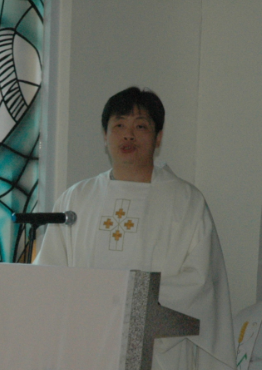
(January 1, 2014)
Peace refers to well-being of daily existence; a state of living in harmony with nature, others and God. It is associated with happiness, salvation, justice and blessing.
Pope Francis’ message for World Day of Peace: Fraternity as foundation and pathway to peace.
Basis of fraternity is found in God’s fatherhood, his specific and personal love for each man and woman. Humans are unable to generate fraternity by themselves; it is regenerated in and by Jesus Christ through his death and resurrection.
Violence occurs when there is lack of fraternity: In South Sudan, the Dinka ethnic group support President Salva Kiir while the Nuer ethnic group support former Vice-President Riek Mahar. 180 000 people displaced and 1000 people killed.
The first reading (Num 6:22-27) is a formula for blessing, semitic way of expressing divine favour by invoking the Lord’s name 3 times: Peace is a gift from God.
The gospel passage (Lk 2:16-21) mentions twice a message that the angels told to the shepherds about the child. The saviour born is Christ and Lord, and God will give peace to those on whom his favour rests.
The second reading (Gal 4:4-7) gives the basis for fraternity. There are two aspects of salvation: freedom from sin (negative) and adoption as children (positive).
FR. EDMOND EH KIM CHEW, OP
St.; Dominic’s Priory

My dear brothers and sisters,
We come together many times during the year to celebrate special Masses here at Saint Dominic’s Priory, however year after year it is this Christmas Mass that draws us here in such great numbers. There is no other celebration during the year that is like tonight. However, unfortunately with the passing of time the original Christmas message portrayed in the way Christmas is celebrated now has little to do with what tonight celebration is about.
The first Christmas was neither beautiful nor perfect. The story of the Christmas we celebrate today was filled with mess and confusion. Mary was expecting and Joseph did not understand this at all. They stuck in a non-familiar place and Mary was in labor. The shepherds were terrified at the apparition of the angel and could not understand the message delivered to them, the three kings or wise men got lost. As you can see the First Christmas has nothing to do with what is portrayed in our Christmas Cards. The First Christmas was not a perfect setting. It was a complete mess.
Nowadays everything about Christmas is beauty, peacefulness and tranquillity. I would like to invite you to look at the way most of our cribs are set up. Mary is shown down on her knees, a distance from the Child, with a blooming face contemplating her son. But you think: how many mothers having just given birth would be able to kneel, even if they wanted to? Would not Mary be portrayed as holding the baby? And would Joseph be portrayed? Would not he be pictured as the most worried man about the safety of Mary and the child like any normal father would do? The beauty of the first Christmas is, that everything which took place 2000 years ago is about our humanity, our redeemed humanity, our vulnerable humanity
We have divinized so much everything about Christmas that we have forgotten the most important part of what we should be celebrating tonight, and that is that God in that messy first Christmas came among us as a vulnerable baby, we should celebrate God divinity taking our human flesh, we should celebrate the vulnerability of God, the humanity of God.
We must celebrate that the first Christmas took place not because God needed it but because we needed it.
So, in our cribs Mary should be portrayed as any ordinary new mother, pale and exhausted, but with her face transformed by joy as she cuddles the child tightly against her. We have to see Joseph deep worried and buried in deep thoughts and we have to picture Jesus not like a glow-in-the-dark statue but as a real live baby who cried and slept, who needed to be fed and to be changed. Only by understanding the humanity of Christmas we will be able to understand those words of Jesus “I have come that you might have live and have it abundantlyâ€.
In his book “Through Seasons of the Heart,†John Powell writes, “God sends each person into this world with a special message to deliver, with a special song to sing …with a special act of love to bestow.â€
Mary and Joseph are given special missions, and we as witnesses of the first Christmas are also entrusted with responsibility of delivering God’s special message or sing God’s special song, or perform God’s special acts of love. Today it is a time for us to reflect on Mary’s role as the Mother of the Messiah and on her answer to God’s call in her life. Likewise, it is also a time to reflect on Joseph’s trust and obedience in God’s divine plan.
We have not been called to play the role as the parents of the Christ, however each one of us is being invited by God to be part of His plan of redemption; some to religious life and priesthood, some to single life, most to marriage and having a family. It is in there that we have to humanize the divinity of the First Christmas. It is in there were we have to meet not the glow-in-the-dark Jesus but the God who is one with us, the God that glorify our humanity.
Tonight, with all the noise around us, let us ponder the words from today’s Gospel, “the birth of Jesus the Christ took place in this way.†Let us examine how the birth of Jesus has made a difference in our life. Let us examine even if we really need Christmas at all.
On behalf of the community here at Saint Dominic’s Priory and on my own behalf wish you all and your families and friends back at home happy, holy and safe Christmas.
 
Alejandro Salcedo, OP
Prior, St. Dominic’s Priory
Macau

VATICAN CITY, September 07, 2013 (Zenit.org) – Hereafter is a Vatican translation of the homily Pope Francis gave this evening in the prayer vigil held in St. Peter’s Square. The Holy Father declared today a Day of Fasting and Prayer for Peace in Syria and around the world. He led a vigil in St. Peter’s Square, which included the praying of the rosary, and Eucharistic adoration.
“And God saw that it was good” (Gen 1:12, 18, 21, 25). The biblical account of the beginning of the history of the world and of humanity speaks to us of a God who looks at creation, in a sense contemplating it, and declares: “It is good”. This, dear brothers and sisters, allows us to enter into God’s heart and, precisely from within him, to receive his message.
We can ask ourselves: what does this message mean? What does it say to me, to you, to all of us?
1. It says to us simply that this, our world, in the heart and mind of God, is the “house of harmony and peace”, and that it is the space in which everyone is able to find their proper place and feel “at home”, because it is “good”. All of creation forms a harmonious and good unity, but above all humanity, made in the image and likeness of God, is one family, in which relationships are marked by a true fraternity not only in words: the other person is a brother or sister to love, and our relationship with God, who is love, fidelity and goodness, mirrors every human relationship and brings harmony to the whole of creation. God’s world is a world where everyone feels responsible for the other, for the good of the other. This evening, in reflection, fasting and prayer, each of us deep down should ask ourselves: Is this really the world that I desire? Is this really the world that we all carry in our hearts? Is the world that we want really a world of harmony and peace, in ourselves, in our relations with others, in families, in cities, in and between nations? And does not true freedom mean choosing ways in this world that lead to the good of all and are guided by love?
2. But then we wonder: Is this the world in which we are living? Creation retains its beauty which fills us with awe and it remains a good work. But there is also “violence, division, disagreement, war”. This occurs when man, the summit of creation, stops contemplating beauty and goodness, and withdraws into his own selfishness.
When man thinks only of himself, of his own interests and places himself in the centre, when he permits himself to be captivated by the idols of dominion and power, when he puts himself in God’s place, then all relationships are broken and everything is ruined; then the door opens to violence, indifference, and conflict. This is precisely what the passage in the Book of Genesis seeks to teach us in the story of the Fall: man enters into conflict with himself, he realizes that he is naked and he hides himself because he is afraid (cf. Gen 3: 10), he is afraid of God’s glance; he accuses the woman, she who is flesh of his flesh (cf. v. 12); he breaks harmony with creation, he begins to raise his hand against his brother to kill him. Can we say that from harmony he passes to “disharmony”? No, there is no such thing as “disharmony”; there is either harmony or we fall into chaos, where there is violence, argument, conflict, fear ….
It is exactly in this chaos that God asks man’s conscience: “Where is Abel your brother?” and Cain responds: “I do not know; am I my brother’s keeper?” (Gen 4:9). We too are asked this question, it would be good for us to ask ourselves as well: Am I really my brother’s keeper? Yes, you are your brother’s keeper! To be human means to care for one another! But when harmony is broken, a metamorphosis occurs: the brother who is to be cared for and loved becomes an adversary to fight, to kill. What violence occurs at that moment, how many conflicts, how many wars have marked our history! We need only look at the suffering of so many brothers and sisters. This is not a question of coincidence, but the truth: we bring about the rebirth of Cain in every act of violence and in every war. All of us! And even today we continue this history of conflict between brothers; even today we raise our hands against our brother. Even today, we let ourselves be guided by idols, by selfishness, by our own interests, and this attitude persists. We have perfected our weapons, our conscience has fallen asleep, and we have sharpened our ideas to justify ourselves. As if it were normal, we continue to sow destruction, pain, death! Violence and war lead only to death, they speak of death! Violence and war are the language of death!
After the chaos of the flood, when it stopped raining, a rainbow appeared and the dove returned with an olive branch. Today, I think also of that olive tree which representatives of various religions planted in the Plaza de Mayo in Buenos Aires in 2000, asking that there be no more chaos, asking that there be no more war, asking for peace.
3. And at this point I ask myself: Is it possible to walk the path of peace? Can we get out of this spiral of sorrow and death? Can we learn once again to walk and live in the ways of peace? Invoking the help of God, under the maternal gaze of the Salus Populi Romani, Queen of Peace, I say: Yes, it is possible for everyone! From every corner of the world tonight, I would like to hear us cry out: Yes, it is possible for everyone! Or even better, I would like for each one of us, from the least to the greatest, including those called to govern nations, to respond: Yes, we want it! My Christian faith urges me to look to the Cross. How I wish that all men and women of good will would look to the Cross if only for a moment! There, we can see God’s reply: violence is not answered with violence; death is not answered with the language of death. In the silence of the Cross, the uproar of weapons ceases and the language of reconciliation, forgiveness, dialogue, and peace is spoken. This evening, I ask the Lord that we Christians, and our brothers and sisters of other religions, and every man and woman of good will, cry out forcefully: violence and war are never the way to peace! Let everyone be moved to look into the depths of his or her conscience and listen to that word which says: Leave behind the self-interest that hardens your heart, overcome the indifference that makes your heart insensitive towards others, conquer your deadly reasoning, and open yourself to dialogue and reconciliation. Look upon your brother’s sorrow – I think of the children: look upon these… look at the sorrow of your brother, stay your hand and do not add to it, rebuild the harmony that has been shattered; and all this achieved not by conflict but by encounter! May the noise of weapons cease! War always marks the failure of peace; it is always a defeat for humanity. Let the words of Pope Paul VI resound again: “No more one against the other, no more, never! … War never again, never again war!” (Address to the United Nations, 1965) “Peace expresses itself only in peace, a peace which is not separate from the demands of justice but which is fostered by personal sacrifice, clemency, mercy and love” (World Day of Peace Message, 1975). Brothers and Sisters, forgiveness, dialogue, reconciliation – these are the words of peace, in beloved Syria, in the Middle East, in all the world! Let us pray this evening for reconciliation and peace, let us work for reconciliation and peace, and let us all become, in every place, men and women of reconciliation and peace! So may it be.
Â













